| Srl | Item |
| 1 |
ID:
101463


|
|
|
|
|
| Publication |
2010.
|
| Summary/Abstract |
It is generally understood that the pattern of repeated expiration and short-term renewal of the federal production tax credit (PTC) causes a boom-bust cycle in wind power plant investment in the US. This on-off pattern is detrimental to the wind industry, since ramp-up and ramp-down costs are high, and players are deterred from making long-term investments. It is often assumed that the severe downturn in investment during "off" years implies that wind power is unviable without the PTC. This assumption turns out to be unsubstantiated: this paper demonstrates that it is not the absence of the PTC that causes the investment downturn during "off" years, but rather the uncertainty over its return. Specifically, it is the dynamic of power purchase agreement (PPA) negotiations in the face of PTC renewal uncertainty that drives investment volatility. With contract negotiations prevalent in the renewable energy industry, this finding suggests that reducing uncertainty is a crucial component of effective renewable energy policy. The PTC as currently structured is not the only means, existing or potential, for encouraging wind power investment. Using data from a survey of energy professionals, various policy instruments are compared in terms of their perceived stability for supporting long-term investment.
|
|
|
|
|
|
|
|
|
|
|
|
|
|
|
|
| 2 |
ID:
132686


|
|
|
|
|
| Publication |
2014.
|
| Summary/Abstract |
This paper introduces the concept of payment probability as an important component of carbon risk (the financial risk associated with CO2 emissions under uncertain climate policy). In modeling power plant investment decisions, most existing literature uses the expected carbon price (e.g., the price of traded permits or carbon tax) as a proxy for carbon risk. In contrast, this paper identifies expected carbon payment as a more accurate measure of carbon risk as perceived by industry practitioners. This measure of carbon risk incorporates both expected price and the probability that this price would actually be faced in the case of a particular investment. This concept helps explain both the surge of activity in 2005-2006 and the subsequent decline in interest in coal-fired power plant development in the U.S. The data for this case study comes from an extensive online survey of 700 U.S. energy professionals completed in 2006, as well as interviews conducted with industry representatives from 2007 to 2009. By analyzing industry views on policy uncertainty and future carbon legislation, we gain a better understanding of investor attitudes toward carbon risk. This understanding will help policy makers design better incentives for investing in low-carbon technologies.
|
|
|
|
|
|
|
|
|
|
|
|
|
|
|
|